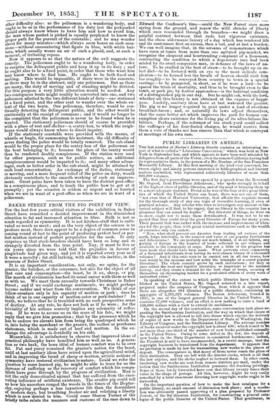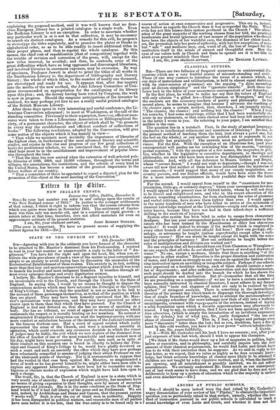PUBLIC LIBRARIES IN AMERICA.
THE last number of Norton's Literary Gazette contains an interesting re- port of what is called a" Librarians Convention," which was held at New York in September last, and which appears to have been well attended by delegates from all parts of the Union ; even the remote California baying had its representative there, in the person of a Mr. Dunbar, of the San Francisco Mercantile Library. At this first meeting of the kind ever convened, be- tween eighty and ninety persons interested in bibliographical ar,d literary matters assembled, who represented collectively libraries of more than. 800,000 volumes.
The first day's proceedings were opened by a speech from the Reverend Mr. Osgood, from Providence Athenrcum ; who spoke strongly in behalf of the highest class of public libraries, and of the need of bringing them up to a more adequate standard. Proud as he was of the four or five great libra- ries of which the United States can boast, there was not one of them, "not even that of Harvard ITniversity, that affords the requisite means for the thorough study of any one topic of recondite learning, if even of practical science. Any scholar who tries to investigate any ancieut or his- torical subject will find, to his regret, that no library in the country hits a plummet that can sound its depths.' But this state of things, he went on to show, ought not to make them downhearted. It was not to be ex- pected that they could rival the great libraries of Europe for many years. Their present task was rather with the increase and improvement of libra- ries for the people, than with great central institutions such as the wealth of centuries only can endow. "Now, what shall prevent our America from leading all natione of the earth, lougo intervallo, in the number and value of our popular Institutions and Athenceums ? We are probably not much behind, it at all behind, any portion of Europe in the number of books collected in our villages and available to the community at large. But not a tithe of the progress has been made that ehould have been made. What prevents every community of a thousand inhabitants from having its well-chosen library of a thousand volumes ? And if this ratio were to be carried out in all our towns, how vast would be the increase and how noble the triumphs or a sound popular literature The whole country grows by such institutions ; for they at once collect the local and fugitive literature, so important to the national history, and they create a demand for the best class of books, securing of themselves an encouraging market for a good-sized edition of every work of undoubted value."
In speaking of the extent to which public libraries have been esta- blished in the United States, Mr. Osgood referred to a late report, prepared under the auspices of Congress, from which it appears that there are altogether 694 libraries of a public character, containing an aggregate of 2,201,623 volumes. The Boston Athenseum founded in 1807, is one of the largest general libraries in the United States. It contains 57,000 volumes, and an effort is now making to raise a fund of 120,000 dollars with a view to extend its usefulness. On the second day of the convention, some conversation took place re- garding the Smithsonian Institution, and the way in which that dame of the copyright law is allowed to fall into disuse which enjoins the delivery of copies of new works to the Department of State at Washington, the Library of Congress, and the Smithsonian Library. The average numbee of books received under the copyright law is about 4ö0; which is said told not more than one-third of the number of new books published annually in the United States. Owing to some defect in the law, the deposit of new books in the State Department is considered burdensome ; intineci, the President is said to have recommended, in a recent message, that the copyright business be transferred from the department. It appears that no provision is made by law for transmitting new works to the places of deposit. The consequence is, that many of them never reach the place of their destination. They are left with the district clerke, which is all that the law enjoins, and the clerks neglect to forward them. In other cams, lumbering new works are sent from remote districts per mail, under the notion that the Smithsonian Institation possesses the franking privilege. Some of those lately forwarded have cost that library twenty times their value in the shape of postage. All this, however, might be very easily remedied by a brief enactment directisg how copyright works ought to be forwarded.
On the important question of how to make the best catalogue for public library, no small amount of discussion took place and a reaola. lion was ultimately passed approving of a plan proposed by Professor Jewett, of the Sni Ithsonian Institution, for constructing a general eats. Logue of the publit libraries of the 1Jnited,15taten That gentleman, in
explaining the proposed method, said it was well known that no first- class European library has a printed catalogue in a single work. Even the Bodleian Library is not an exception. In order to ascertain whether any particular work is or is not in that collection, it may be necessary to search six distinct catalogues. As a remedy for this evil, he proposes to stereotype the titles separately, and to preserve the plates or blocks in alphabetical order, so as to be able readily to insert additional titles in their proper places, and then to reprint the whole catalogue. By this means, the chief cost of republication (that of composition) together with the trouble of revision and correction of the press, will, except for the new titles inserted, be avoided ; and thus, he contends, some of the great difficulties which have so long oppressed and discouraged librarians, and involved libraries in enormous expenses, may be overcome. By way of specimen Professor Jewett is about to print the titles of all works in the Smithsonian Library in the department of bibliography and literary history ; the whole of which titles, to the number of nearly one thousand, are stereotyped and ready for use. It appears that, after due inquiry into the merits of the new method, the Joint Library Committee of Con- gress recommended an appropriation for the cataloguing of its library upon this plan ; and, the money having been voted by Congress, the work is now in progress. Should the sanguine anticipations of the inventor be realized, we may perhaps yet live to see a really useful printed catalogue of the British Museum Library. After three days spent in very interesting and useful conference, the Li- brarians Convention adjourned ; to meet at Washington, at the call of the standing committee. Previously to their separation, however, efficient mea- sures were taken to form a Librarians Association or Bibliographical So- ciety, of a permanent character, the object of which shall be "to promote in every way the establishment and efficient conduct of collections of books.' The following resolutions, adopted by the Convention, will give some notion of the objects which it has mainly in view- " That while we maintain most decidedly the importance of libraries of the highest class, in furtherance of the most advanced literary and scientific studies, and rejoice in the rise and progress of our few great collections of books for professional scholars, we are convinced that, for the present, our chief hope must be in the establishment and improvement of popular libra- ries throughout the land. "That the time has now arrived when the extension of well-selected pub- lic libraries of 1000, 5000, and 10,000 volumes, throughout the towns and villages, the associations, the institutions, and the schools of every kind in the United States, has become a matter of the greatest importance to the future welfare of our country. "That a committee of three be appointed to report a digested plan for the promotion of this object at the next meeting of the Convention."



































 Previous page
Previous page